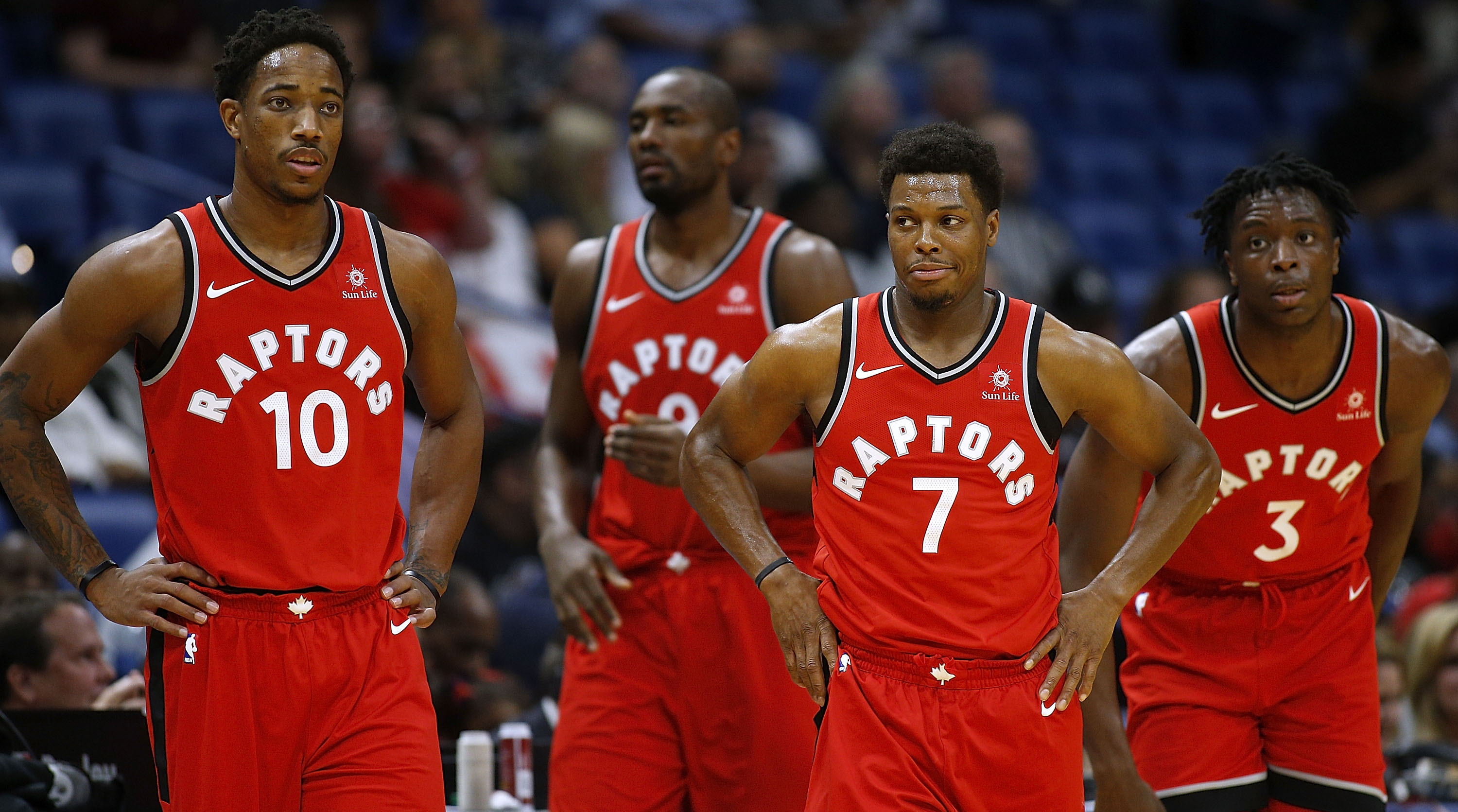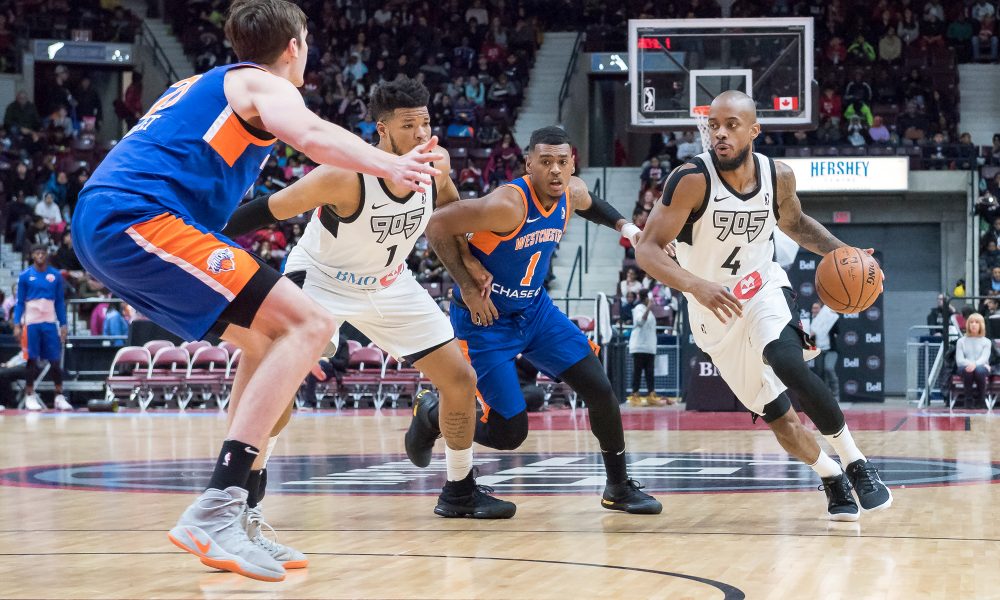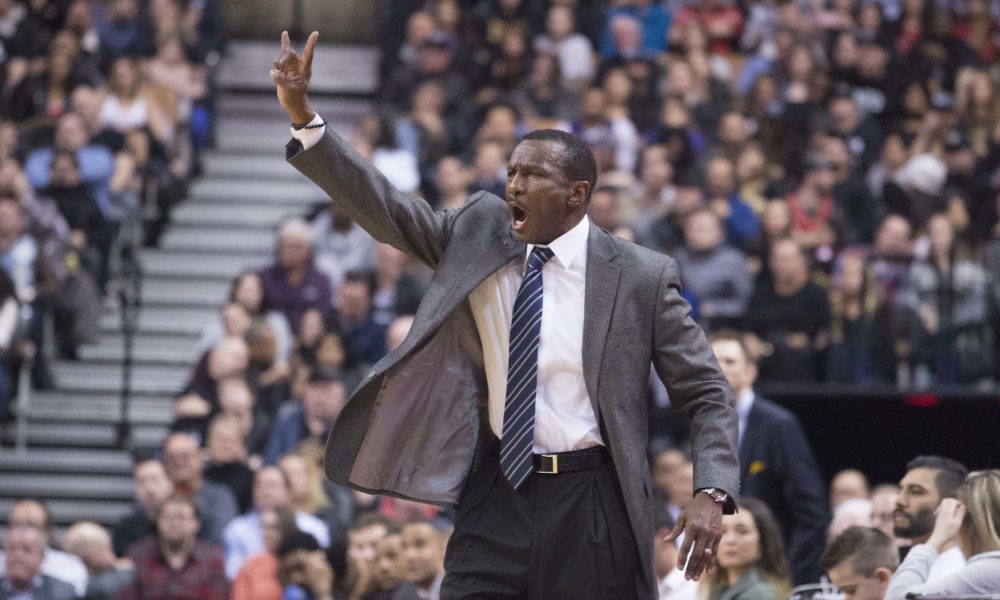Losing on Saturday night to the Celtics sucked. There wasn’t really an excuse this time around. All eyes were on the game, the Raptors had adequate rest, were fully healthy, and playing a short-handed Celtics team on the road. But, as we’ve seen in the past several games from the Raptors, some lazy habits have settled into their routine, with a shaky defense and increasingly unpredictable shooting playing a big role.
The Raptors’ net rating has dipped significantly in their past 10 games. With only a +2.7 net rating during the 10-game stretch, the Raptors have been allowing in excess of 111 points per 100 possessions, indicating that the defense really has started to slip. Granted, a large part of this 10 game stretch was due to a brutal schedule in March where it seemed like the Raptors played on almost every night (which wasn’t far from the truth – they played, on average, more than a game every two nights for a period of almost 4 weeks). Not to mention, the Raptors didn’t seem to have a ton to play for, as the number one seed seemed to be wrapped up for most of that stretch. But, the way the Celtics have absorbed their injuries in stride with almost no impact to their winning in recent games, things have gotten interesting at the top of the Eastern Conference standings. The Raptors stand just 2 games ahead of second place Boston, with two critical games against Cleveland and Boston again upcoming on Tuesday and Wednesday.
One of the Raptors’ most glaring deficiencies on the offensive side of the ball, further substantiated by our observations on Saturday night, has been a drastic dip in three-point shooting (which has been under 33% over that stretch, on over 33 long-range attempts a night). For the most part, the offense has been willing to shoot it, and has been generating great looks that just haven’t been going down – and it seems like all three-point shooters not named Kyle Lowry have been just super cold (namely CJ Miles, who’s shooting a dreadful 26% in his last 10 games). For a team that wants to make more 3’s per game as part of a pace-and-space and offense, that kind of shooting from one of our primary three-point shooters just isn’t good enough. We’re going to need both CJ and Serge to be closer to 40% if we’re going to have any shot in shootouts against Cleveland or against zone defenses from the Celtics. Shooting unlocks this offense, and it’s quite honestly just not happening right now.
Offensive inefficiencies have been compounded by a slightly slower pace of play, and an increased turnover rate which have been additional road-blocks in generating efficient offense. It’s put added pressure on guys like Fred VanVleet and Delon Wright, who at the end of the day, are still relatively inexperienced in being able to facilitate plays against first units consistently (as they often do). That’s not to say they haven’t been amazing all year, but to an extent, the slight dip we’ve seen even from a guy like Jakob Poeltl shouldn’t shock any of us.
A lot of the deficiencies we’ve seen have been somewhat masked by the winning confidence the Raptors seemed to have fostered this year, even amongst their young players. Just think back to recent wins against the Nuggets, Magic, Nets, Mavericks or even Hawks. All of those games had a common theme – uninspiring first half efforts followed by stronger second half performances to squeak by for narrow victories. It made for a whole lot of “we’re happy about the win, but disappointed about our effort” post-game comments from Dwane Casey. Every night in March, it seemed like the Raptors didn’t deserve to win, but they magically made a win appear out of thin air.
These factors have resulted in fewer blowouts, more crunch time reps, more closing lineup combinations, and the emergence of Pascal Siakam and Fred VanVleet as pillars in the team’s success. And all of this has put Dwane Casey in an interesting coaching spot having to meet nightly demands that he probably wasn’t as concerned about in December, January and February. We were blowing teams out back then, but closer games and tighter whistles have forced his hand a little bit, making him more experimental in the way lineups, especially in the second halves of ball games, have been managed.
Recency bias aside, it’s hard to ignore the most recent game in all of this (and probably the most disappointing of these recent losses). The Raptors lost doing exactly what the Celtics wanted them to. Rather than play a high scoring fast-paced game, the Celtics lulled the Raptors into a slower half-court contest with muddling zone defense schemes, ultimately holding off the Raptors to under 100 points for just the second time in their past 28 games. From the tip, while the score was close and though DeMar was lighting it up, it always felt like the Celtics had full control of the pace of play, with a stretchier lineup of Al Horford, Marcus Morris, Jaylen Brown and Jayson Tatum all on the court for the closing minutes, offering a unique blend of length, shooting, athleticism and defense that stymied the Raptors down the stretch. It was a reminder that if the Raps don’t put their imprint on a game, they have a tough time winning under an opponent’s control. That means moving the ball on offense, keeping the Celtics guessing, and simply put – just making your shots. The best cure to a zone defense is making open shots, and the Raptors (who shot 8/35 from deep) didn’t do that.
Having said all of this, weighing our feelings more towards the last 10 games than the 60-game sample size preceding that, would just be silly. All things considered, the Raptors have clearly been the best team in the Eastern Conference this year. But one thing is for sure – it’s looking more and more like it’s going to come down to a few intangibles to really experience playoff success. Last year, after the Cavaliers stole game 3 from the Raptors at the ACC and virtually eliminated any shot of a series win for Toronto, I wrote a piece about the “mental game” that is the game of basketball. Those who watched that series as closely as I did would’ve noted that the Cavs generated a ton of open shots and made almost all of them. But when the Raptors came down the court and set up shots of their own, they just couldn’t bury ‘em when it counted. Whether it was Patrick Patterson, Cory Joseph or PJ Tucker, shots didn’t go down when they needed to, and that was clearly a mental hurdle that had to be overcome. It was quite obvious after 3 games in that series that the Cavs mentally owned the Raptors – it was that simple. The Cavaliers dictated the pace of play, they asserted themselves on offense, and controlled every facet of the game in a way that completely overwhelmed Toronto. The Raptors just couldn’t leave their imprint on any of the games.
In many respects, this year’s Raptors team will be tested in similar ways as last year. Just as we’ve seen in the past 10 games, and last year in the playoffs – the offense can and will probably generate open shots. And it’ll be up to guys like CJ, Serge, or even JV, OG Anunoby or Pascal Siakam to be the pressure release valve in those situations and knock ‘em down at a high rate. Kyle and DeMar will have to be facilitating threats in addition to scorers, and the bench mob has to be as effective as they’ve been all year. We’ve seen that this team is more than capable of meeting those expectations – but surpassing that mental hurdle could quite honestly be the biggest test.
It’s going to come down to if the Raptors’ can forge their own identity in playoff games. Are they going to impose their will on other teams, or respond to being what’s being thrown at them? When the times get tough, and brightest of lights are on every decision they make , will they revert to iso-ball from their stars, or trust the new offensive system? Will they hit open shots? Will the defense travel? Those are the critical questions.
Whether it’s from the Cavs, Celtics, or even Sixers, it’s only a matter of time until the Raptors hit adversity in the playoffs – it’s just how they’re going to deal with it this time around that will decide their fate.



